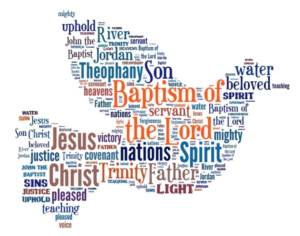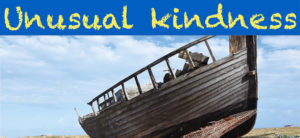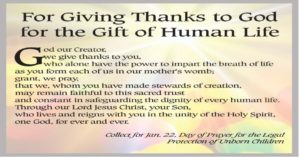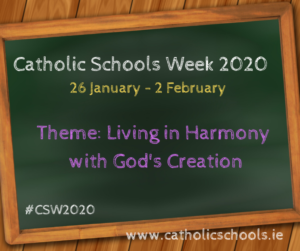January 6th The Epiphany
Today the Church celebrates the Solemnity of the Epiphany. “The Lord and ruler is coming; kingship is his, and government and power.” With these words the Church proclaims that today’s feast brings to a perfect fulfilment all the purposes of Advent.
https://www.catholicculture.org/culture/liturgicalyear/calendar/day.cfm?date=2020-01-05
January 13th Feast of the Baptism of our Lord /Féile Bhaisteadh an Tiarna

“And a voice from heaven said, “This is my Son, the Beloved, with whom I am well pleased.”
“Tháinig glór ó na flaithis a dúirt, “Is é seo mo Mhac muirneach dár thug mé gnaoi.”
Today the Church celebrates the Solemnity of the Baptism of Our Lord. This brings to an end the season of Christmas. The Church recalls Our Lord’s second manifestation or epiphany, “Epiphany” means “manifestation”, a making present, a revealing, which occurred on the occasion of His baptism in the Jordan. Jesus descended into the River to sanctify its waters and to give them the power to beget sons of God. The event takes on the importance of a second creation in which the entire Trinity intervenes.
http://education.dublindiocese.ie/ppbaptismresources/
January 18th-25th Christian Unity Week /Aontacht Chríosta

The materials for the 2020 Week of Prayer for Christian Unity have been prepared by the Christian churches in Malta and Gozo (Christians Together in Malta). On 10th February many Christians in Malta celebrate the Feast of the Shipwreck of St Paul, marking and giving thanks for the arrival of Christian faith on these islands. The reading from the Acts of the Apostles used for the feast is the text chosen for this year’s Week of Prayer. In such tempestuous journeys and chance encounters, God’s will for his Church and all people comes to fulfilment. As Paul will proclaim in Rome, this salvation of God has been sent to all peoples (see Acts 28:28)
You can find updates about the Week of Prayer for Christian Unity on Twitter by following the #wpcu2020 hashtag.
Hospitality is a much needed virtue in our search for Christian unity. It calls us to a greater generosity to those in need. The people who showed unusual kindness to Paul and his companions did not yet know Christ, and yet it is through their unusual kindness that a divided people were drawn closer together. Our own Christian unity will be discovered not only through showing hospitality to one another, but also through loving encounters with those who do not share our language, culture or faith. For further resources see: https://ctbi.org.uk/weekofprayer and https://www.jesuit.ie/news/unusual-kindness/
January 20th Celebrate World Religion Day / Ceiliúradh Domhanda ar Reiligiún
The aim of World Religion Day, held on the third Sunday in January every year, is to promote inter-faith understanding and harmony. Through a variety of events held around the globe, followers of every religion are encouraged to acknowledge the similarities that different faiths have. The purpose of World Religion Day is to highlight the ideas that the spiritual principles underlying the world’s religions are harmonious, and that religions play a significant role in unifying humanity
https://www.twinkl.ie/event/world-religion-day-2020
https://www.awarenessdays.com/awareness-days-calendar/world-religion-day-2020/
January 21st Martin Luther King Day / Lá in onóir Martin Luther King
Martin Luther King Day is a federal holiday held on the third Monday of January. It celebrates the life and achievements of Martin Luther King Jr., an influential American civil rights leader.
Martin Luther King was born in Atlanta, Georgia, on January 15th 1929, in the heart of the American south. From an early age, he was aware that black people were not treated as equal citizens in America. Martin Luther King was a Christian. He became a doctor of theology and in 1954 a Baptist minister in Montgomery, Alabama. He believed that the only way to achieve equality was by non-violent and peaceful forms of protest. He is well known for his campaigns to end racial segregation on public transport and for racial equality in the United States.
Further resources can be found at: http://education.dublindiocese.ie/ppmartinlutherkingresources/,
This has clear links with Section F of the Junior Certificate Syllabus (old) ‘The Moral Challenge’ Part 4 and ‘Religious Morality in Action’. They can also be used with Senior Cycle R.E classes.
January 22nd Day of Prayer for the Legal Protection of Unborn Children

January 22 is the anniversary of Roe v. Wade and the day established by the Church of penance for abortion, has been formally named as the “Day of Prayer for the Legal Protection of Unborn Children.” All human beings are created in the image and likeness of God.
Love is not merely a feeling, but is rather the desire for the best possible good for those whom we love. Through our natural intelligence and through Divine Revelation we become aware of the value of this most basic of all gifts which is life. Mere reason leads us to comprehend that it is better to be alive than never have had been in existence. The knowledge of the value of life that comes through revelation leads us to understand better this gift and to appreciate it: as a result, we worship and love more and more the Giver of this gift. This love is what moves us to protect the life of the unborn or any who might be unjustly treated.
https://www.catholicculture.org/culture/liturgicalyear/calendar/day.cfm?date=2020-01-22
January 24th St. Francis de Sales / Naomh Proinsias de Sales
The Salesian Society, founded by Saint John Bosco, takes its distinctive name from its patron, Saint Francis de Sales. http://www.newadvent.org/cathen/13398b.htm
St. Francis de Sales was a man whose conduct and manners were not the least of the means by which he brought many souls to God. It was he who recommended that everyone who wished to practice charity should cultivate what he called “the little virtues”: friendliness, courtesy, good manners, consideration, patience and understanding, especially with the difficult.” (Frank Duff – Servant of God)
We can epitomize the character of St. Francis in two words: kindliness and loveableness — virtues that were the secret of his success. Born on August 21, 1567, and ordained to the priesthood in 1593. From 1594 to 1598 he laboured at the difficult and dangerous task of preaching to the Protestants of Chablais and effected the return of some 70,000 souls to the Catholic faith. In 1602 he became Bishop of Genf. His zeal for souls is attested in 21,000 extant letters and 4,000 sermons, and his writings reflect his kind-heartedness and sweet disposition.
O God, who for the salvation of souls willed that the Bishop Saint Francis de Sales become all things to all, graciously grant that, following his example, we may always display the gentleness of your charity in the service of our neighbour.
Amen
https://www.catholicculture.org/culture/liturgicalyear/calendar/day.cfm?date=2020-01-24
https://www.catholic.org/saints/saint.php?saint_id=51
January 25th The Conversion of St. Paul / Iompú Naomh Pól
“Rejoice in hope, endure in affliction, persevere in prayer” (Romans 12:12).
St. Paul is one of the most important and influential of all the saints. Many of his writings are contained in the Canon of the Bible and have influenced the growth and development of the Church since the first century. St. Paul was originally known as Saul, and he was a Roman citizen and a Pharisee. The story of Paul’s Conversion reminds us of our continual need for conversion.
The Conversion of St. Paul begins when Paul was Saul, a devout son of Israel (Phil. 3:6). Saul hunted his theological enemies, the Christians, wherever they resided. He witnessed and approved of the murder of St. Stephen. He was on the way to Damascus to arrest more Christians when a bright light knocked him to the ground. A voice asked, “Saul, Saul, why are you persecuting me?” When Saul asked this victim’s identity, the voice replied, “I am Jesus, whom you are persecuting.” This was the moment of conversion, the moment where Saul ceased and Paul proceeded. No argument convinced this master of the Law; it was an encounter with the risen Christ, whom Saul had been persecuting in his war against Christians.
https://www.catholic.org/saints/saint.php?saint_id=91
https://www.catholicculture.org/culture/liturgicalyear/calendar/day.cfm?date=2020-01-25 https://catholicexchange.com/st-paul-school-conversion
January 27th Holocaust Memorial Day / Lá Cuimhneacháin ar an Il-loscadh
Don’t be content in your life just to do no wrong, be prepared every day to try and do some good.
– Sir Nicholas Winton, who rescued 669 children from Nazi-occupied Europe
Holocaust Memorial Day 2020 marks 75 years since the liberation of Auschwitz-Birkenau, the largest Nazi death camp. The theme for HMD 2020 is: Stand Together. Holocaust Memorial Day 2020 also marks the 25th anniversary of the Genocide in Bosnia.
Read more here: https://www.hmd.org.uk/learn-about-the-holocaust-and-genocides/bosnia/
Holocaust Memorial Day Trust (HMDT) encourages remembrance in a world scarred by genocide. We promote and support Holocaust Memorial Day (HMD) – the international day on 27 January to remember the six million Jews murdered during the Holocaust, alongside the millions of other people killed under Nazi Persecution and in subsequent genocides in Cambodia, Rwanda, Bosnia and Darfur.
The Holocaust threatened the fabric of civilisation, and genocide must still be resisted every day. Our world often feels fragile and vulnerable and we cannot be complacent. Prejudice and the language of hatred must be challenged by us all. HMD is for everyone.
https://www.hmd.org.uk/take-part-in-holocaust-memorial-day/holocaust-memorial-day-2020/
HOLOCAUST MEMORIAL DAY
The National Holocaust Memorial Day commemoration takes place in Dublin every year on the Sunday nearest to the 27 of January, in the Mansion House. It is organised under the auspices of Holocaust Education Trust Ireland in association with The Department of Justice and Equality and Dublin City Council.
Date: 26 January 2020
Time: 6 – 8 pm
Venue: The Round Room at the Mansion House, Dawson Street, Dublin 2
The Holocaust Memorial Day commemoration cherishes the memory of all who perished in the Holocaust. It recalls six million Jewish men, women and children and millions of others who were persecuted and murdered by the Nazis because of their ethnicity, disability, sexual orientation, political affiliations or their religious beliefs. The ceremony includes readings, survivors’ recollections, candle-lighting and music. It is attended by people from all walks of life and is a moving and dignified event.
To attend: There is no charge for attending HMD but it is necessary to apply for invitations.
To apply: Contact the HETI office at info@hetireland.org giving the names and addresses of all persons requesting invitations. They will be registered on the guest list and invitations will be sent out in early January.
E: info@hetireland.org T: +3531 6690593
https://hetireland.org/programmes/holocaust-memorial-day/
For Schools
Commemorative booklets reflect the ceremony and some of the history of the Holocaust. They serve as an excellent resource for schools, students and researchers. Download any of the HMD booklets by visiting: https://hetireland.org/programmes/holocaust-memorial-day/publications
January 28th Feast Day of St. Thomas Aquinas / Féile Naomh Tomás Acuin
St. Thomas Aquinas is the Dominican order’s greatest glory. He taught philosophy and theology with such genius that he is considered one of the leading Christian thinkers. His innocence, on a par with his genius, earned for him the title of “Angelic Doctor.”
St. Thomas ranks among the greatest writers and theologians of all time. His most important work, the Summa Theologiae, an explanation and summary of the entire body of Catholic teaching, has been standard for centuries, even to our own day.
This Student’s prayer is attributed to him and can be used with your students.
Creator of all things, true source of light and wisdom, origin of all being, graciously let a ray of your light penetrate the darkness of my understanding. Take from me the double darkness in which I have been born, an obscurity of sin and ignorance. Give me a keen understanding, a retentive memory, and the ability to grasp things correctly and fundamentally. Grant me the talent of being exact in my explanations and the ability to express myself with thoroughness and charm. Point out the beginning, direct the progress, and help in the completion. I ask this through Christ our Lord. Amen.
https://stream.org/prayers-thomas-aquinas/ http://education.dublindiocese.ie/st-thomas-aquinas/
https://www.catholic.org/saints/saint.php?saint_id=2530
https://www.catholicculture.org/culture/liturgicalyear/calendar/day.cfm?date=2020-01-28
January 27th-3rd Feb Catholic Schools Week 2020
‘Living in Harmony With God’s Creation’/ Maireachtáil go Sítheach Le Gach ar Chruthaigh Dia.
 Catholic Schools Week 2020 will be celebrated from Sunday 26 January to Sunday 2 February 2020 on the theme ‘Living in Harmony With God’s Creation’. The theme encourages us to see that we all have a responsibility to care for the earth, not just for our own future, but for the future of every one of God’s creatures.
Catholic Schools Week 2020 will be celebrated from Sunday 26 January to Sunday 2 February 2020 on the theme ‘Living in Harmony With God’s Creation’. The theme encourages us to see that we all have a responsibility to care for the earth, not just for our own future, but for the future of every one of God’s creatures.
Again, this year, resources for Catholic Schools Week will be available online. All lessons have resources for both Junior and Senior Cycle. Each lesson contains practices which support the national Literacy and Numeracy Strategy, as well as self-reflective practices as a way of supporting assessment in the classroom. They also provide extension exercises as an option for your students.
Check out the section on Catholic Schools Week here or log on to www.catholicschools.ie to download the CSW 2020 resources.
January 30th Feast Day of St. Aidan of Ferns
Naomh Maodhóg (Aodhán) Priomhéarlamh Deoise Fhearna
St. Aidan Bishop and missionary, born in Inisbrefny, in County Cavan, circa 550, who is probably to be identified with Aidan. As a small boy, he was held as a hostage by Aedh Ainmire, High King of Ireland, probably to ensure the loyalty of his family. Released, Aidan studied at Kilmuine, in Wales, a famed institute of Christian learning conducted by St. David. In 580, he returned to Ireland, going to the coast of Wexford. He served the area and was honoured by Bran Dubh at the synod held to celebrate victory over King Aedh. Ferns, the area in which Aidan conducted his priestly ministry, was elevated at this time to the status of a diocese. Aidan was appointed the first Bishop of Ferns and became Ard-Escops or Chief Bishop of the region. In time he was called Mogue, “the beloved Aidan.” The episcopal seat is no longer in Ferns but in Enniscorthy, where a Cathedral was dedicated to Aidan.
http://www.staidanscathedral.ie/our-parish/a-brief-history/
January 31st Feast Day of St. Don Bosco / Féile Naomh Eoin Bosco
St. John Bosco was the founder of the Salesian Society, named in honour of St. Francis de Sales, and of the Daughters of Mary, Help of Christians. There are currently 15,560 members (priests and brothers) in the Salesian Congregation, working in 131 countries around the world.
The Salesians have been working in Ireland since 1919. They work for young people in a number of centres and services throughout the country. They are involved in schools, care homes, university hostels, parishes, agricultural education, chaplaincy, spirituality centres, retreats and prayer, the social media, drug rehabilitation and non-formal education.
St. John Bosco’s lifework was the welfare of young boys and girls, hence his title, “Apostle of Youth.” He had no formal system or theory of education. His methods centred on persuasion, authentic religiosity, and love for young people. He was an enlightened educator and innovator.
Don Bosco is a man of many colours: priest, saint, founder, mystic, and prophet, servant of the young and the poor, educator, pastor, social activist, evangelist, healer, writer, churchman. He is a man aflame with the glowing fire of Sinai shining through myriad activities, talents and charismatic gifts; truly a man of God wrapped in an ecstasy of love-filled and hope-filled action with a worldwide reach.
Fr. Bosco died on January 31, 1888. The call for his canonization was immediate. Pope Pius XI knew Fr. Bosco personally and agreed, declaring him blessed in 1929. St. John Bosco was canonized on Easter Sunday, 1934 and he was given the title, “Father and Teacher of Youth”.
https://www.catholicculture.org/culture/liturgicalyear/calendar/day.cfm?date=2019-01-31
https://www.catholic.org/saints/saint.php?saint_id=63
Naomh Eoin Bosco (1815-1888)
Rugadh Naomh Eoin Bosco ar 16 Lúnasa 1815 d’Aisti Piedmont san Iodáil. Bhí drochbhail ar eacnamaíocht na hIodáile tar éis Chogaí Napoléon. Caitlicigh an-tughta do Dhia ab ea a theaghlach. Fuair a athair bás nuair a bhí Eoin dhá bhliain d’aois agus bhí ar a mháthair soláthair dá triúr mac. Bhí tionchar mór aici ar mhúnlú pearsan Eoin. Sa bhliain 1825 nuair a bhí sé naoi mbliana d’aois bhí a chéad aisling, de mhórán díobh aige. Cuireadh in iúl dó, go mbeadh tionchar mór aige ar shaol buachaillí bochta a bhíodh ag imirt cluichí agus ag mallachtach le linn dóibh bheith ag súgradh.Thosaigh sé ag caint leo agus ag léiriú dóibh nach raibh an ceart acu. De bharr na bochtaineachta, ní bhfuair sé aon scolaíocht agus chaith sé tús a shaol mar aoire.
Fuair sé a bhun oideachas ó shagart paróiste a chuaigh i bhfeidhm go mór air agus a spreag é chun bheith ina shagart, cé ag an am ba iad daoine mór le rá a théadh leis an ghairm sagartóireachta. Ba fheirmeoirí muintir Bhosco. D’fhág sé a bhaile féin nuair a bhí sé dhá bhliain déag d’aois agus fuair sé breis oideachais ó shagart aosta, Joseph Cafasso a thug faoi deara na buanna ar leith a bhí ag Eoin. Chuaigh sé go dtí cliarscoil agus tar éis sé bliana ornaíodh ina shagart é. Ba mhian a chroí é, cabhrú leis an aos óg agus go mór mór le páistí na mbocht. Theastaigh uaidh leas buan a dhéanamh dóibh. Bhunaigh sé Cuallacht na Sailéisineach sa bhliain 1852 chun freastal ar na hoibre sin agus Cuallacht Mhná Rialta sa bhliain 1852 ar a dtugtar Siúracha na Maighdine, Cabhair na gCríostaithe. Is iomaí cineál oibre ar son na hEaglaise a raibh lámh aige ann. Bhí an- mhuinín aige as Dia agus an Mhaighdean Mhuire. Chloígh sé gach deacracht i gcúrsaí a chuid oibre le cúnamh Dé. Fuair se bás sa bhliain1888.
Naomhainmnigh an Pápa Pius X1 é sa bhliain 1934. Ceiliúrtar a lá fhéile ar 31 Eanáir gach bliain.
A Dhia, a roghnaigh Naomh Eoin Bosco le bheith mar athair agus oide ag an aos óg agus a chuir cuallachtaí nua ar bun san Eaglais, gríosaigh le lasracha na carthanachta sinne, le do thoil a dhéanamh ar an saol seo. Áiméan.
Other Dates/Information (Dataí Eile/Eolas):
Nutrition for the Soul / Cothú don Anam
Excellent resources available here from Pat Murphy, including reflections and posters https://patsnutritionforthesoul.blogspot.com/
Faitharts
Faitharts is a website for those interested in the relationship between religion and the arts, especially the popular arts, and especially in relation to education. The perspective is Catholic and Irish, and its particular audience is religion teachers, but hopefully anyone with a general interest in the area will find something useful or thought provoking.
Editor: Brendan O’Regan, teacher of English and Religion. http://www.faitharts.ie/advent.html
Videos for RE
There has been a significant shift in recent years on the part of both Church and State and it’s reflected in the new JC specification and will impact on the NCCA review of Senior Cycle RE shortly.
Two recently recorded interviews are likely to be helpful to teachers grappling with this question and to anyone who expects to be undertaking an interview for an RE post in the next year or two:
- Dr. Gareth Byrne (DCU & Catholic Centre for Religious Education) explains how all students can do RE from their own perspective (which includes students who are practicing Catholics). See https://www.icatholic.ie/religious-education-gareth-byrne/
- Audrey Doyle (DCU and Le Chéile Trust) unpacks the rationale behind the recent reform of the Junior Cycle RE specification and the implications for Catholic Schools. See https://www.icatholic.ie/junior-cycle-re-audrey-doyle/
